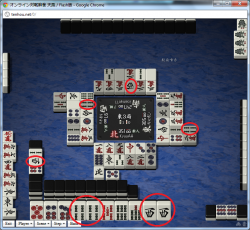Karaten
Karaten 「カラテン」, or empty tenpai, is a state where a tenpai hand does not have the ability to win. This is due to unavailability of all instances of winning tiles. The "visible tiles" may either be discarded, used as a dora indicator, or already exist in one's hand. Furthermore, they may be held in other player's hands or even reside within the dead wall. However, the latter case is beyond a player's visibility.

Ambiguity
The term is often confused with the "fifth tile" case. Here, a hand waiting for a fourth tile that is simply hidden, discarded, or used by someone else remains a valid tenpai in all circumstances. A hand may contain a 1-2 penchan and a previously declared kan of 3-3-3-3 in the same suit. This renders the threes unavailable as winning tiles. Because of the prevalence of keishiki tenpai, it is assumed that if the rule is different, it would be announced what qualifies as tenpai or not. As a precaution, it is almost always mentioned.
Quirks
- On Ron2, there has been an instance of a person being able to call riichi with a gutshot wait shape for a 6-pin when they have made a closed kan of 6-pin already. The hand was considered noten, but did not trigger a chombo penalty (mainly due to programming assuming no one could do something that could be viewed as faulty). This conforms to the usual keishiki tenpai interpretation that the hand was not in a valid tenpai shape when it came to scoring a drawn hand, but not okay for determining if a player was legally allowed to declare riichi.
- On Tenhou, there have been reports of a hand containing 12s44466688p with a kan of 3s, scored as in tenpai. This does not conform to the usual keishiki tenpai standard. Tenhou staff have confirmed that there was a decision to simplify interpreting if a hand was tenpai due to programming constraints. All hands that conform to keishiki tenpai are valid, as well as a few (such as the current case) that may not be.